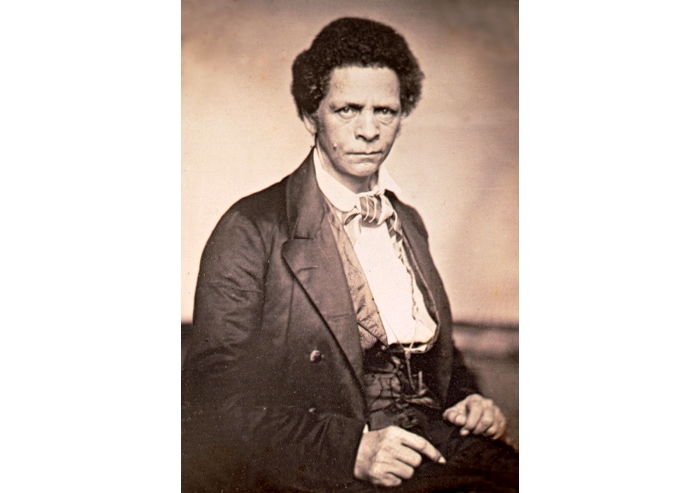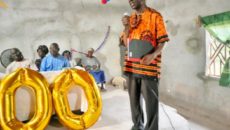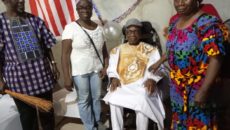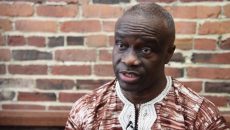During the Liberian Civil War, I lived and worked at the US Embassy in Monrovia for a season. During that time, I interviewed many destitute and desperate Liberians with no jobs, no food and no place to live. Many could not even leave the country. I asked these ordinary Liberians what they would do if they survived the war and got an opportunity to serve in government. Nearly everyone responded this way: “J.J. Roberts didn’t build Liberia; I will eat my own too.â€
As Liberia celebrates former President Joseph Jenkins Roberts’ birthday, I wonder what has been the government’s purpose for this holiday, especially since the political elites were never interested in the examples of Roberts.
I wonder what it will take to make Liberia number one in Africa within this generation. Is it even possible to make Liberia the leading democratic and most developed African country in our lifetime?
Judging from Liberia’s old age (168 years old), the accolades and failures of current and past leaders, Liberia’s current ranking as the 5th poorest country in the world with 47.6 percent literacy, impassable roads during every rainy season, less than 2 percent of the population connected to electricity grid, outrageously high salaries and benefits for elected officials, endemic corruption in government and society and the culture of impunity, the outlook for Liberia seems grim and hopeless at first sight.
However, when viewed through the lens of Liberia’s first president, the unlimited pool of talents and gifts of Liberia’s youth and generations yet unborn and the patriotic actions of many ordinary Liberians like the late Albert Porte and living legends like my father Rev. Mahn C. Krua Sr., who were not elected officials, I am convinced that Liberia is poised to become the land of unlimited opportunities and the embodiment of the dreams of economic, social and political freedom for all Liberian citizens in our lifetime through citizens’ initiatives movement for social change.
The illustration of how the vision of Liberia’s sustainable development goals are achievable in our lifetime is best shown through the stories of two friends (Benjamin Swan and Mahn C. Krua) born in similar situations in two different countries.
Throughout their lives, Benjamin Swan, an American; and Mahn C. Krua Sr., a Liberian; worked tirelessly for the greater common good, justice, human rights, education and civic engagement in their respective countries.
However, in their old ages, they are living in drastically different living conditions; Krua has returned to his home town where the living conditions are the same as they were 90 years ago, impoverished, without access to opportunities, basic services, electricity, portable water and lots of personal difficulties.
Swan, on the other hand, rose from poverty, lack of opportunities, and inaccessibility to electricity and potable water. He is now a state representative in a prosperous state with a budget of US$38 billion dollars, sustainable development, and largely equal opportunities for all citizens – Massachusetts.
Swan’s life best illustrates the secret of success in a democratic country. The fortune was not the work of politicians; it was the result of ordinary citizens organizing a movement which became the fuel for democratic and economic progress in America.
A poor African-American man born in Belzoni, Mississippi, Swan grew up in a rural town where he was denied every opportunity for advancement. There was no electricity, no telephone, and no running water. When he visited the town of Ziah in 2008, Swan was shocked at the similarities between the Nimbaian town and his. “This place looked very much my hometown, Belzoni, Mississippi where I grew up,†he remarked then.
Swan often walked barefooted, ate with his hands and walked to substandard schools housed in a church. The classes were not held in separated rooms. Pupils in one class could follow lessons taught simultaneously in the other classes on the other side of the isle in the church auditorium. He lived in the segregated southern United States at a time when the laws restricted Blacks from opportunities, voting and sharing toilets with Whites.
“I lived in Apartheid America,†he said. “Change didn’t come about because the government gave us freedom, we organized and fought for all our rights – voting, education, equal opportunities.â€
“No one is going to do it for you,†the state representative said, as he referenced the civil rights movement of the 1960’s led by Martin Luther King Jr., who was not an elected government official.
Because of the success of the movement, Swan gained access to opportunities and rose up from abject poverty to a place of prominence as a lawmaker in one of America’s most developed states. America is different today, thanks to ordinary citizens. Although there are some flaws in the system, all citizens generally have equal access to opportunities and are guaranteed security irrespective of race, religion and ethnicity.
Almost 100 percent of American citizens have access to electricity, a nationwide network of paved highways, home delivery of mails, free public education, free food and meals for students, safe potable drinking water, guaranteed treatment for sick people showing up at hospitals, police protection, scholarships and financial aid for college students, and unemployment compensation.
In 2016, Swan was one of many legislators who voted to pass the budget of US$38 billion for the state. Even with this huge budget, Swan is not a rich man like many African lawmakers. He does not own a house, has no bodyguard, no driver, no government-purchased vehicles, and no gas slips.
His salary of US$62,000 per year is less than the salaries of lawmakers in the impoverished country of Liberia. Swan is a proud tenant in an apartment building owned by someone else. He cooks his own meals and washes his own clothes. He is a celebrated public servant.
To illustrate the broken system in Liberia created by political parties and “qualified†political elites to enrich themselves at the expense of citizens, let’s look at the life of Swan’s friend, Rev. Mahn C. Krua, Sr.
Born in Gbasseh Town, Grand Bassa, Krua’s parents later moved to Nimba County and settled in a village we’ll call Zotaplay. One day, the chief, who regularly terrorized his citizens with impunity, brutally killed a young woman he accused of practicing witchcraft. Krua’s family confronted the chief and told him they would no longer tolerate his terror.
Later, they traveled by foot for nearly 100 miles to file a complaint with the government at a military base. The chief was arrested and jailed for one month. After his release, he was angry that news of his evil deeds was now public information. He threatened the Kruas, and they were forced to leave behind their land and belongings and settled in another town near Graie.
In the late 1930’s – at about the same time Swan was growing up – a group of all White American missionaries from the southern United States where Ben Swan lived under “apartheid conditions†arrived in rural Liberia to “evangelize.†These Americans were given land by the Liberian government to educate Liberians while spreading their gospel. The White missionaries reneged on their obligations to educate Liberians, claiming “God sent us only to evangelize, not to educate.†Krua disagreed with the Americans and decided to do something about it.
Krua and another pastor, John Demey, soon organized a self-help education group with Krua as the ring leader of the education movement. He was appointed principal of the new school, Ziah Mission School. The team carried bags of cement on their heads 12 miles away to a place called Ziah, purchased 250 acres of land and began construction of a school building, a boys’ dormitory and a girls’ dormitory. They also planted cocoa and other cash crops to sustain the school.
When the civil war erupted in Liberia in 1989, forcing Krua to flee to America, he and Swan met and later became friends. Together, they took a trip from America to Liberia in 2008 to visit the Ziah Mission School. Krua would later move back to his Liberian hometown where conditions for citizens are still horrible – the same as they were 90 years ago. Liberian Politicians still live in luxury as they have always done since 1847.
As Liberians celebrate the 207th anniversary of the first president of an independent African country, it is important to reflect on the contributions and sacrifices of Roberts. As 2017 approaches and “qualified†politicians are preparing their platforms, now is the time to demonstrate why democratic societies only flourish with citizens’ movements and countries always languish when they look up to political elites who use the national revenue to enrich themselves.
Ironically, while Liberia celebrates Joseph Jenkins Roberts’ Day, most Liberians have never seen the will of Roberts, in which he donated his estate and US$10,000 (the equivalent of a quarter of a million in today’s US dollars) to educate Liberian children. By concealing the will of the first president, Liberia’s political elites, the trustees of Roberts, and the United Methodist Church have robbed Liberia and Africa of a bright future.
Let’s applaud President Joseph Jenkins Roberts for his foresight and commitment to serve humanity and the people of Liberia. He believed education would be the key to equal opportunities and sustainable development.
In a 2014 survey conducted at the 2014 United Methodist Church Annual Conference in Gbarnga, 90 percent of respondents interviewed by Universal Human Rights International testified that they had never heard of or seen the text of Roberts’ will.
Thus, the most powerful information for the transformation of Liberia and Africa was in effect stolen by the ruling elites and the United Methodist Church, who hid this information from most Liberian children and their parents while teaching the story of Maltida Newport’s mass murder of indigenous Liberians as history lesson in all schools across Liberia.
Yoko Ono once said, “A dream you dream alone is only a dream. A dream you dream together is reality.†The Liberian political system is broken because it serves only the ruling elites and deny ordinary citizens their basic rights and opportunities. Ordinary citizens must come together to create a new system to make Liberia’s greatness a personal and national priority for which each individual must be prepared to do whatever it takes.
Like Ben Swan, who rose from the same conditions existing across rural Liberia to a better quality of life because of citizens-led movement, ordinary Liberians must also believe that with faith, all things are possible. Faith must be put in action. Ordinary Liberians must make the necessary sacrifice for the common good, not personal gain.
It’s going to take massive national civic education. It’s going to take the training of a new generation of leaders committed to public service. It’s going to take creating a new system that effectively ends politics as the primary avenue to enrich the ruling elites. It will take making the ordinary citizens the masters of the republic with authorities to set the salaries and benefits of public servants.
It will take the introduction of citizens’ initiatives as law of the land, thus granting powers to ordinary citizens to make laws, repeal laws and recall elected officials without the permission or approval of the national legislature or the president elected by the people. It will take the people asserting themselves as the boss and the politicians humbled to being public servants. It will take ordinary people like you and the likes of Ben Swan and Mahn Krua.
Let’s do it!
Featured photo by Rufus Anson



